
Geoenvironmental Disasters
metrics 2024
Navigating the complexities of environmental crises.
Introduction
Geoenvironmental Disasters, published by SPRINGERNATURE, is a leading open-access journal dedicated to advancing the interdisciplinary fields of environmental science, geography, and geotechnical engineering. Since its inception in 2014, the journal has made significant strides in disseminating high-quality research that addresses the challenges posed by geoenvironmental hazards and their impacts on society. With an impressive Q1 ranking across multiple categories, including Environmental Science (miscellaneous) and Geography, Planning and Development, it occupies a vital niche within the academic community. The journal’s rigorous peer-review process ensures that only the most insightful contributions are made available to a global audience. Researchers, professionals, and students are encouraged to engage with the content, which covers a wide range of topics, including disaster management, risk assessment, and stakeholder engagement in policy-making. This commitment to open-access accessibility since 2014 further enhances its reach and impact, providing a critical platform for advancing knowledge and innovation in managing geoenvironmental disasters.
Metrics 2024
 -
- 3.80
3.80 -
- -
-Metrics History
Rank 2024
IF (Web Of Science)
JCI (Web Of Science)
Quartile History
Similar Journals
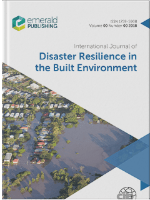
International Journal of Disaster Resilience in the Built Environment
Exploring strategies for resilient construction.International Journal of Disaster Resilience in the Built Environment is a leading peer-reviewed journal published by Emerald Group Publishing Ltd, focusing on the crucial intersection of disaster resilience and the built environment. Established in 2010, this journal serves as an essential platform for researchers, professionals, and students engaged in the fields of Building and Construction, as well as Safety, Risk, Reliability and Quality, maintaining a respectable Q3 ranking in both categories as of 2023. With a commitment to enhancing global knowledge on resilient construction practices, the journal examines innovative strategies to mitigate risk and enhance safety in built structures. Despite its robust academic reputation, it currently operates without an open access model, emphasizing its curated approach to high-quality scholarship. The publication aims to foster interdisciplinary collaboration and advance the development of sustainable practices within the context of disaster risk reduction, making it a vital resource for anyone dedicated to improving resilience in the built environment.

BULLETIN OF VOLCANOLOGY
Unveiling the Secrets of Volcanic ActivityBULLETIN OF VOLCANOLOGY, an esteemed journal published by Springer, serves as a vital platform for disseminating cutting-edge research in the field of volcanology and related geosciences. With its ISSN 0258-8900 and E-ISSN 1432-0819, this journal has garnered a reputation for excellence, evidenced by its Q1 ranking in Geochemistry and Petrology as of 2023, and its impressive Scopus rank of #39 out of 154 in Earth and Planetary Sciences. Established in 1930 and spanning converged years until 2024, the journal has continuously provided researchers, professionals, and students a comprehensive view into volcanic processes, their impacts on the environment, and the implications for climate change. Although not open access, the valuable insights and groundbreaking studies published within its pages ensure that BULLETIN OF VOLCANOLOGY is indispensable for those seeking to deepen their understanding of the dynamic Earth.
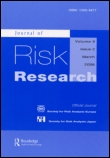
JOURNAL OF RISK RESEARCH
Advancing Knowledge in Risk Analysis and ManagementJOURNAL OF RISK RESEARCH, published by Routledge Journals, Taylor & Francis Ltd, is a prestigious academic journal dedicated to advancing the understanding of risk across diverse fields, including engineering, safety, social sciences, and management. With its impact reflected in its Q1 quartile rankings in multiple categories and a solid standing in Scopus rankings, this journal serves as an essential resource for researchers, professionals, and students aiming to explore the complexities of risk analysis and its implications in real-world scenarios. The journal has been consistently publishing high-quality research since 1998, contributing to both theoretical frameworks and practical applications. While not open access, the content of the journal is invaluable for those keen on staying at the forefront of risk research. By addressing the multifaceted nature of risk, including safety, reliability, and strategic management, the JOURNAL OF RISK RESEARCH plays a vital role in shaping contemporary discussions and innovations in risk management and decision-making.

International Journal of Engineering and Geosciences
Exploring the synergy between technology and the Earth.The International Journal of Engineering and Geosciences, with ISSN 2548-0960, is a premier academic journal published by Selcuk University Press, specializing in the interrelated fields of engineering and geosciences. Established as an Open Access resource in 2016, the journal aims to enhance the dissemination of research, fostering collaboration and innovation within the scientific community. Based in Turkey, this journal serves as a vital platform for researchers and professionals to share their findings and contribute to the advancement of knowledge in environmental science and related disciplines. With an impressive Q2 category ranking in the field of Environmental Science (miscellaneous) for 2023, it ranks #81 out of 219 in Scopus, placing it in the 63rd percentile. The journal not only acknowledges transformative research trends from 2019 to 2024 but also emphasizes the importance of sustainability and environmental stewardship in engineering practices, making it an indispensable resource for students, researchers, and professionals passionate about the intersection of these disciplines.

Progress in Disaster Science
Transforming Knowledge into Action for Disaster ManagementProgress in Disaster Science, published by ELSEVIER, is a prestigious open-access journal that has been advancing the field of disaster research since its inception in 2019. With an ISSN of 2590-0617, the journal has quickly established itself as a leading resource, recognized for its impact across various related disciplines, as evidenced by its impressive Q1 rankings in 2023 in categories such as Earth and Planetary Sciences, Environmental Science, Geography, Planning and Development, and Safety Research. This journal publishes cutting-edge research that aims to enhance understanding and management of disaster risks, resilience, and recovery processes. Additionally, the journal's accessibility ensures that important findings are disseminated widely, fostering collaboration among researchers, professionals, and students globally. Positioned under the umbrella of critical environmental and safety insights, Progress in Disaster Science plays a pivotal role in shaping the discourse surrounding disaster management and preparedness in today's rapidly changing world.
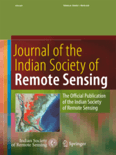
Journal of the Indian Society of Remote Sensing
Pioneering Insights into Remote Sensing TechnologiesJournal of the Indian Society of Remote Sensing, published by SPRINGER, stands as a prominent contribution to the fields of Earth and Planetary Sciences and Geography, Planning and Development. With an ISSN of 0255-660X and an E-ISSN of 0974-3006, this esteemed journal has been in circulation since 1973, showcasing a rich repository of research and advancements in remote sensing applications, methodologies, and technologies, specifically within the Indian context and beyond. The journal's impact is underscored by its placement in the Q2 category of both Earth and Planetary Sciences and Geography as of 2023, ranking impressively in the Scopus database with significant percentiles. With the intent to bridge the gap between theory and practical application, it invites scholars, researchers, and professionals to contribute innovative studies that enhance our understanding of remote sensing and its implications in various domains. The Journal of the Indian Society of Remote Sensing is a vital resource for anyone looking to remain at the forefront of research in this dynamic field.
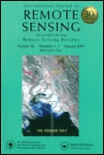
INTERNATIONAL JOURNAL OF REMOTE SENSING
Innovating Solutions through Cutting-Edge Remote Sensing ResearchInternational Journal of Remote Sensing, published by Taylor & Francis Ltd, stands at the forefront of Earth and Planetary Sciences, providing a critical platform for disseminating pioneering research since its inception in 1980. With an impressive ranking of #25 out of 195 in general Earth and Planetary Sciences and a notable 87th percentile on Scopus, this journal is recognized for its high-quality contributions that span diverse topics including satellite imagery analysis, geospatial technologies, and environmental monitoring. As a Q1 journal in its field for 2023, it offers invaluable insights and methodologies that are essential for researchers, professionals, and students alike. Although not Open Access, the journal facilitates a comprehensive understanding of remote sensing sciences, ensuring that the scholarly community remains updated with the latest advancements, trends, and applications that impact global challenges.

International Journal of Disaster Risk Science
Pioneering research for a resilient future in disaster science.The International Journal of Disaster Risk Science, with ISSN 2095-0055 and E-ISSN 2192-6395, is a premier, peer-reviewed open-access journal published by Springer. Since its inception in 2011, the journal has been dedicated to advancing knowledge and practice in the field of disaster risk science, facilitating critical discussions around disaster preparedness, response, and resilience across various regions of the globe. This journal holds impressive rankings, including Q1 in Geography, Planning and Development, and Q1 in Safety Research for 2023, confirming its high impact within the academic community. With converged publication years from 2010 to 2024 and being ranked in the top 10% in multiple categories, it serves as an essential resource for researchers, professionals, and students alike. As an open-access journal, it ensures that cutting-edge research is freely available, promoting wider dissemination and engagement with topical issues in disaster risk management.
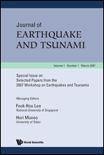
Journal of Earthquake and Tsunami
Exploring the depths of geophysical phenomena.Welcome to the Journal of Earthquake and Tsunami, a premier scholarly publication dedicated to advancing the field of geophysical research, with a particular focus on seismic activity and tsunami phenomena. Published by World Scientific Publishing Co Pte Ltd, this journal provides a vibrant platform for researchers and practitioners alike to share their findings and innovations, contributing to the global understanding of these critical natural events. With an impact factor that reflects its relevance, the journal is categorized in Q3 quartiles for 2023 in areas including Geophysics, Geotechnical Engineering, and Oceanography, indicating a solid standing in the scientific community. It is indexed within Scopus, ranking in the upper half of its categories, which further establishes its importance as a resource for students and professionals seeking to stay informed about the latest developments. Although the journal operates under a traditional access model, its commitment to fostering scholarly discourse remains unwavering. Founded in 2008 and set to converge its offerings until 2024, the Journal of Earthquake and Tsunami continues to be an invaluable resource for anyone dedicated to understanding the dynamic and often dangerous interactions of our planet’s geological features.

Remote Sensing
Advancing Knowledge in Earth and Planetary SciencesRemote Sensing is a highly esteemed journal published by MDPI, dedicated to the domain of Earth and Planetary Sciences. With an impressive impact factor reflected in its rank of #16 out of 195 in the general Earth and Planetary Sciences category, this journal achieves a commendable 92nd percentile among its peers, indicating its significant contribution to the field. Since its inception in 2009 as an Open Access journal, it has enabled researchers, professionals, and students from around the globe to access high-quality, peer-reviewed articles that delve into the latest advancements in remote sensing technologies, methodologies, and applications. Based in Switzerland, Remote Sensing serves as a vital platform for disseminating innovative research that supports and enhances our understanding of Earth's processes and environments, ensuring scientific knowledge remains freely accessible and impactful.